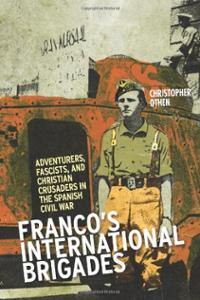Book Review: Franco’s International Brigades
 This article appeared in the 35th issue of the newsletter of the International Brigade Memorial Trust and is reprinted here with the IBMT’s permission.
This article appeared in the 35th issue of the newsletter of the International Brigade Memorial Trust and is reprinted here with the IBMT’s permission.
This well written book tells the story of the foreign troops who fought on Franco’s side in the Spanish Civil War. The main body came from Morocco, a Spanish dependency, where Franco commanded the Army of Africa (some 80,000 troops) before the outbreak of the civil war. This was supplemented by the crack German Condor Legion (30,000 strong) and several divisions of the Italian regular army (70,000 men under arms) and some 8,000 army regulars from Portugal.
The main concentration of the book, however, is on the 3,000 volunteers from many parts of the world, including Ireland. These consisted of a ragbag of religious fundamentalists (mainly Catholic), virulent anti-communists, fascist activists, social misfits and upper class adventurers. Many fitted most, if not all, of these categories. Christopher Othen reminds us that foreign soldiers made up only 2.2 per cent of the Republican army, but at least 13.2 per cent of Franco’s rebel forces. The author sketches the story of the ill-fated Irish pro-fascist brigade. Led by General Eoin O’Duffy, a vainglorious ex-IRA member turned fascist party leader (of the National Corporate Party), and spurred on by the Catholic hierarchy informed by fierce anti-communism, the 600-strong force stumbled from one military disaster to the next during the Battle of Jarama. After three months the Irish Brigade was withdrawn from Spain in March 1937 on the recommendation of the commander of Franco’s Foreign Legion.
The book’s tone is generally sober and non-partisan except when it comes to the communists. Othen is no fan of Franco and observes that the foreign volunteers who fought on his side were “men whose ideas of a modern Europe did not involve democracy”. However, the book is marred by the usual anti-communist canards. Thus, for Othen, the International Brigades were Stalin’s army rather than volunteers recruited mainly by national communist parties
across some 30 countries. And the Popular Front government in Spain was, in the author’s opinion, Stalin’s creation, and not the result of internal Spanish political developments over decades.
Tom Sibley’s biography of International Brigader and Communist Party Industrial Organiser Bert Ramelson (c0-written with Roger Seifert), “Revolutionary Communist at Work”, is published by Lawrence & Wishart (London, 2011).












